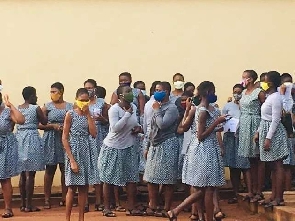Aburi (E/R), Nov. 21, GNA - Nana Otubour Djan Kwesi, the Chief of Aburi on Thursday, reiterated the need for government to set-up handicraft centres in the regional capitals to boost the local economy. He said a chunk of the nation's human resources had been gifted with the talent of handicraft and needed to be discovered. Nana Djan Kwesi made the appeal at a one-day seminar held at Aburi that sought to find out the problems confronting the handicraft industry, solutions and to salvage the drastic decline of the export of the products of the industry. The workshop funded by Export Development and Investment Fund (EDIF) was on the theme "Growing the Handicraft Industry for Export". Mr Collins Boateng, Executive Secretary of the Ghana Export Promotion Council (GEPC), said statistics available to the council indicated that export of handicraft products between the year 2000 and 2007 had reduced.
Comparing figures within the periods, he said, the sector earned US dollar 4.977, 14.892, 11.310, 4.167, 5.202, 20.822, 4.490, and 3.796 million from the year 2000 to 2007 respectively. Mr Boateng said observations revealed that the decline after 2001 was due to China's vigorous competition with Ghana on the assorted handicrafts with new designs, excellent finishing and lower prices in basketry and statues products. He said checks made by the GEPC had shown that as at the end of the third quarter of 2008, the sector yielded about US 8 million dollars and the figure for the total export at the end of the year was expected to hover around US five million. He said the implication was that the various interventions to boost the industry were not effective and not yielding results as expected. Mr Boateng said for the sector to recover from the current declining rates, the Ministry of Trade and Industry, Presidential Special Initiative on Craft Development document should be redesigned with recommendations from institutions such as Aid To Artisans Ghana and (ATAG) and GEPC.
Mr Maxwell Kusi, Marketing Research Manager of GEPC presenting a paper on market development, said other factors that accounted for the decline was the minimal design and quality gap between craft products in the low and middle segments of the markets. He said emerging business trends had changed to on-line transaction and handicraft from Ghana had not yet adopted this new trend. Mr Kusi said there was the urgent need to secure major international buyers interest to procure products from Ghana and also create awareness on trends in colours, materials, shapes, finishing, prices, styling, branding and packaging. With regards to market strategies, He said, the sector should establish partnership with European and United States companies and organise design swaps or exchanges in order to learn new techniques and gain insight into the market. He said the industry should explore the opportunity of frequently instituting International Handicraft Fairs in Ghana. Mr Kusi noted that exporters in the industry needed to be supported in the e-business to enhance their access to market information. He said there was the need to take proactive steps to establish Design Centres, offshore and on-shore warehousing facilities and showrooms, provide permanent national showroom in Accra to enhance market capacities of export companies. 21 Nov. 08
Business News of Friday, 21 November 2008
Source: GNA












